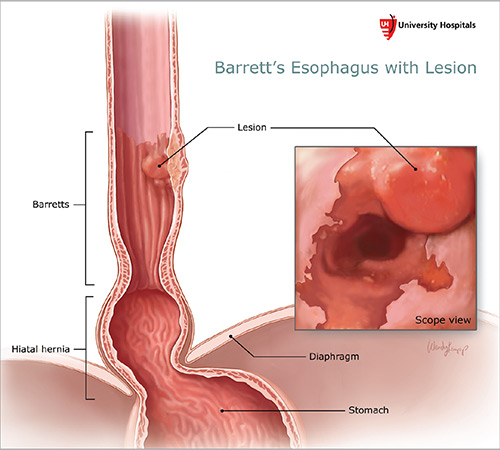Barrett’s Esophagus Disease and Treatment
Digestive health specialists at University Hospitals use the most innovative diagnostics and treatment methods for patients with Barrett’s esophagus.

Don’t Delay Your Care.
Barrett’s Esophagus is a serious disease that can progress to cancer if not carefully diagnosed, monitored and treated. Call 216-844-8500 to schedule an evaluation with an esophageal disease expert today.Typically, a complication of long-term heartburn or gastroesophageal reflux disease (GERD), Barrett’s esophagus is identified when the lining of the lower esophagus changes to a mixture of gastric and intestinal cells. Our upper GI specialists offer a multispecialty team approach from initial diagnosis through treatment and ongoing monitoring to keep patients well and improve quality of life.
Full Spectrum of Diagnostics and Monitoring Capabilities
Our team at University Hospitals uses the full spectrum of diagnostics and monitoring capabilities for patients with signs of Barrett’s esophagus including:
- ESOCheck: A new and completely noninvasive way to collect esophageal tissue samples for diagnostic testing. For this five-minute office procedure, patients simply swallow a pill-sized capsule that is attached to a thin silicone catheter. Once in the stomach, the physician inflates a special balloon inside of the capsule and then slowly withdraws it. As the balloon moves back up through the esophagus, its textured surface collects cells which can then be tested in the laboratory. ESOCheck provides a safe alternative to endoscopy for patients with risk factors for Barrett’s Esophagus.
- Biopsy: Through a pathology examination of the mucous membranes from the esophagus, Barrett’s esophagus can be identified and monitored.
- Upper Endoscopy: Also called an esophagogastroduodenoscopy or EGD, this procedure uses a scope to examine the lining of the esophagus, stomach and the small intestine. Using a thin, flexible lighted tube, the physician can examine the tissues and take samples for further testing.
- Endoscopic ultrasound: A minimally invasive procedure, an endoscope produces detailed images of the lining and walls of your digestive tract for analysis. This ultrasound technology helps determine the depth of any lesion or tumor and any lymph node involvement.
- Follow-up surveillance
- Periodic repeat examinations
Advanced Treatment Options to Reduce Risk of Esophageal Cancers
With Barrett’s esophagus, your risk for adenocarcinoma, a type of esophageal cancer, increases. An intermediate step between Barrett’s esophagus and the development of esophageal cancer is called dysplasia, or the presence of abnormal cells. It is very important to have routine examinations by a Barrett’s esophagus specialist to detect any abnormalities, even if your health seems satisfactory.
Our board-certified specialists use the most advanced Barrett’s esophagus treatments to care for our patients . With an individual treatment plan, we determine the optimal care for each patient, based on individual needs. Treatment methods may include:
- Endoscopic Mucosal Resection (EMR): A less invasive procedure with minimal discomfort, EMR is used to remove low- and high-grade dysplasia or early or superficial cancerous growth. This non-surgical technique removes smaller sections of abnormal tissue or any elevated nodules from the inner lining of the esophagus, using a long tube or endoscope.
- Endoscopic submucosal dissection (ESD): Similar to EMR using a long tube or endoscope, ESD is the removal of a gastrointestinal lesion that has not yet entered the muscle layer. The complete removal of a larger lesion allows our pathology team to examine an entire tissue specimen ranging in size from one to five centimeters.
- Radiofrequency Ablation (RFA):Using heat energy, RFA is an endoscopic technique to destroy damaged tissue. Using a balloon catheter initially and then followed with an electrode endoscope, our team destroys any areas of abnormal growth.
- Cryotherapy Ablation: Also called cryoablation, this process uses extreme cold to destroy damaged tissue.Using super cooled liquid nitrogen or compressed nitrous oxide, we freeze any abnormal tissue.
- Argon Plasma Coagulator (APC): An endoscopic procedure used to control bleeding or remove diseased tissue within the gastrointestinal tract, this noncontact thermal energy procedure uses ionized argon gas to stop bleeding or destroy abnormal tissue.
- Surgery: Called esophagectomy, or the surgical resection of the esophagus, surgery may be needed for more severe cases of Barrett’s esophagus. A complex surgical procedure, our team removes cancerous lesions from within the esophagus.In addition, our team performs anti-reflux surgery to control severe gastrointestinal reflux disease (GERD) to avoid complications such as Barrett’s esophagus.
Understanding the Risk Factors of Barrett’s Esophagus
A Barrett’s esophagus diagnosis is relatively common and affects both men and women. It is found more frequently in Caucasians and in older men (50 years and older). Other causes of Barrett’s esophagus include:
- Chronic gastroesophageal reflux disease (GERD)
- Cigarette smoking
- Obesity
Life-Long Surveillance Improves Barrett’s Esophagus Outcomes
Many patients suffer in silence. That’s because Barrett’s esophagus symptoms can be minimal, but the damage from long-term acid reflux can be very serious. Sometimes other diseases mimic acid reflux, making the diagnosis and treatment more complex. Our highly-skilled specialists make sure each patient with Barrett’s esophagus has a thorough diagnosis and individualized treatment plan.
Even after treatment, patients require lifestyle changes including a Barrett’s esophagus diet and life-long monitoring for any changes. Our team carefully monitors your condition for any issues or additional tissue damage.
For More Information about Specialized Care for Barrett’s Esophagus
If you have concerns or questions about your digestive health, contact one of our team members at a location close to you.
Get Expert Care
Barrett’s Esophagus is a serious disease that can progress to cancer if not carefully diagnosed, monitored and treated. Call 216-844-8500 to schedule an evaluation with an esophageal disease expert



